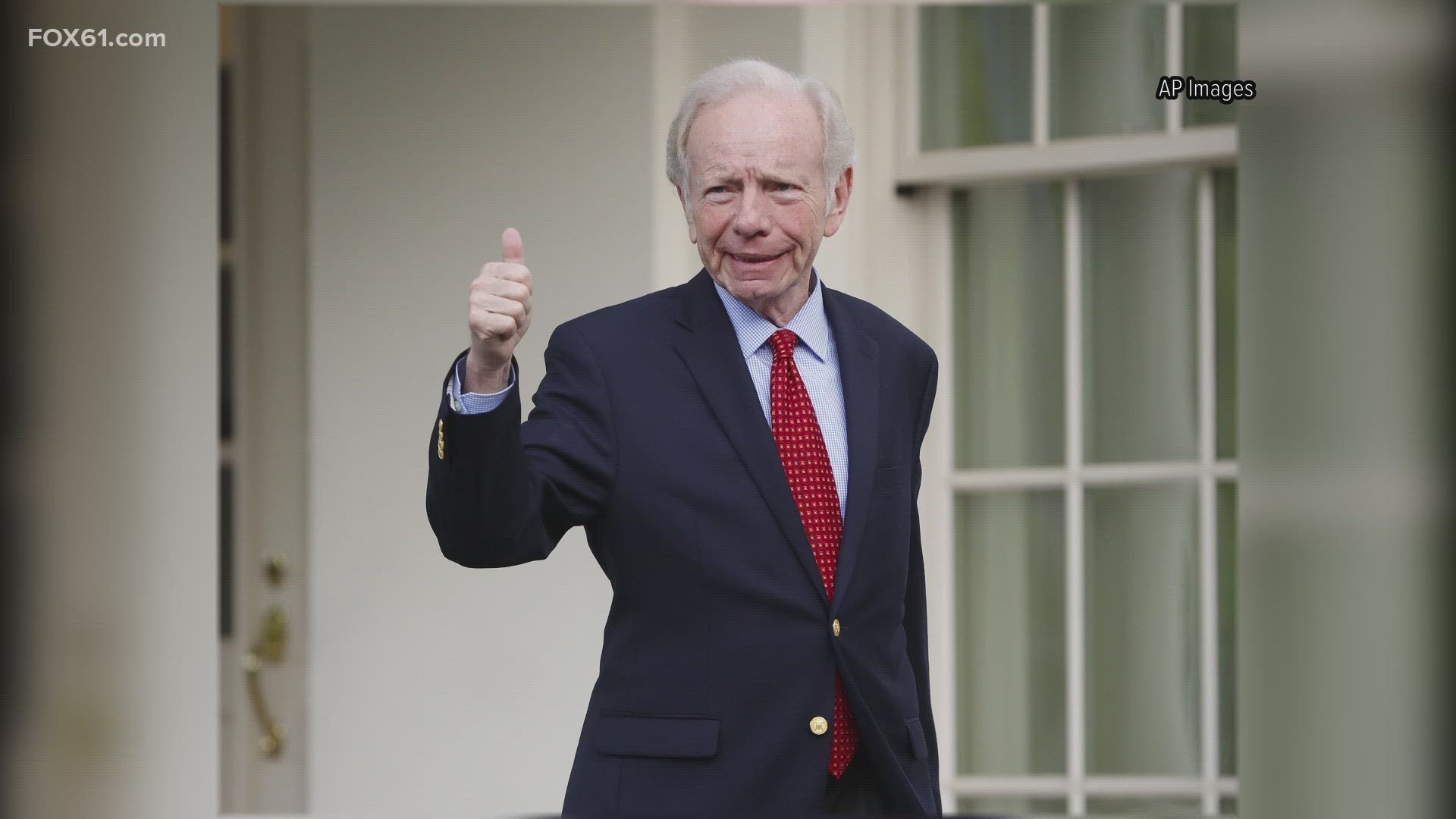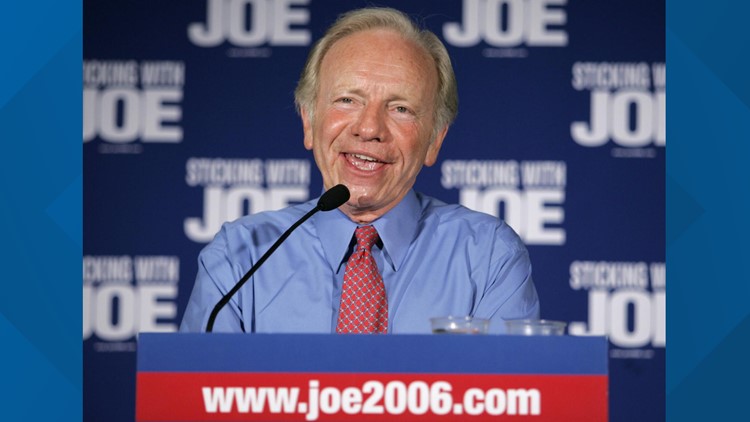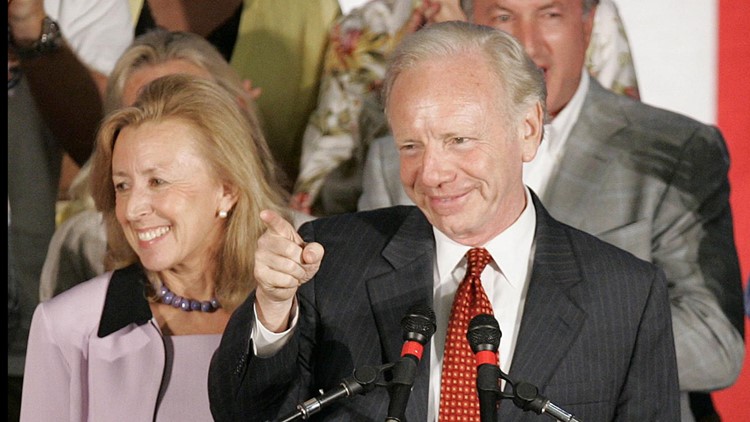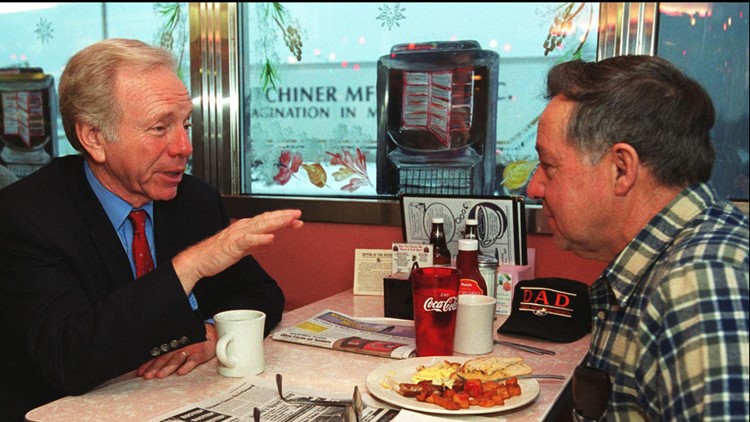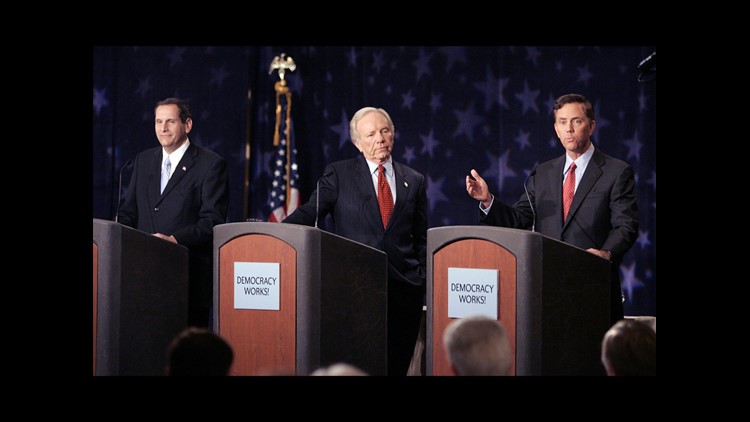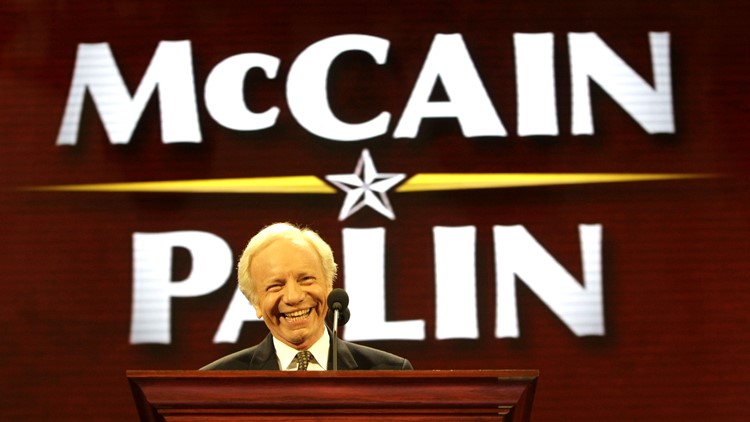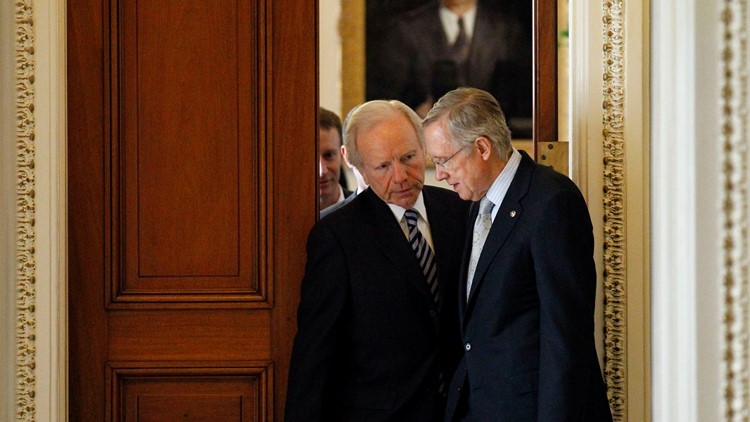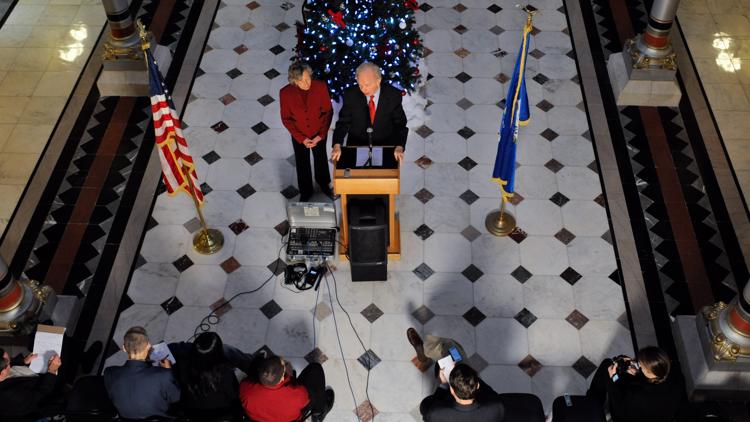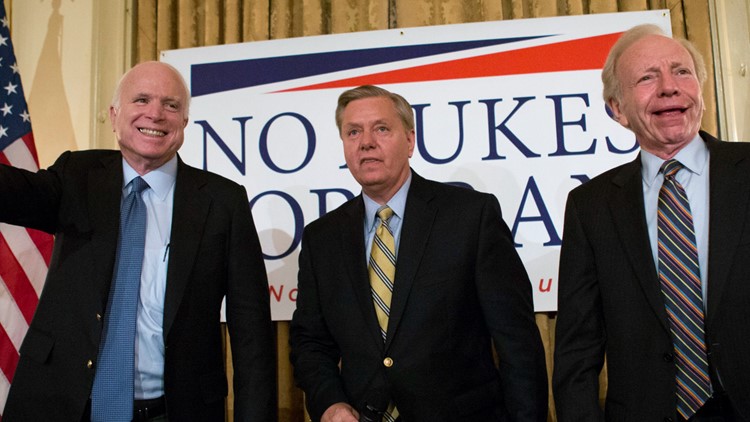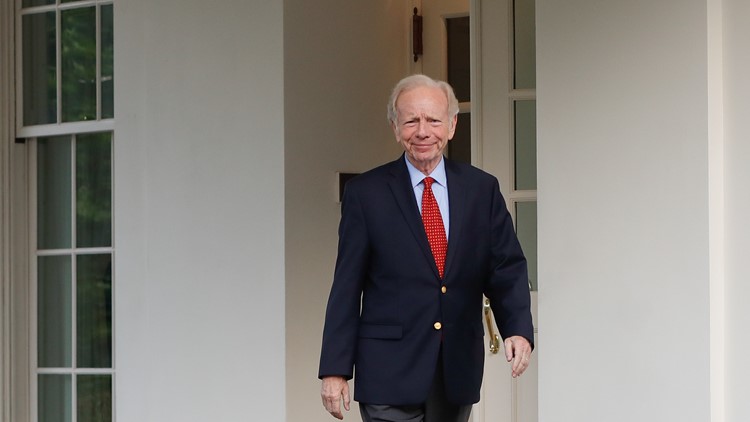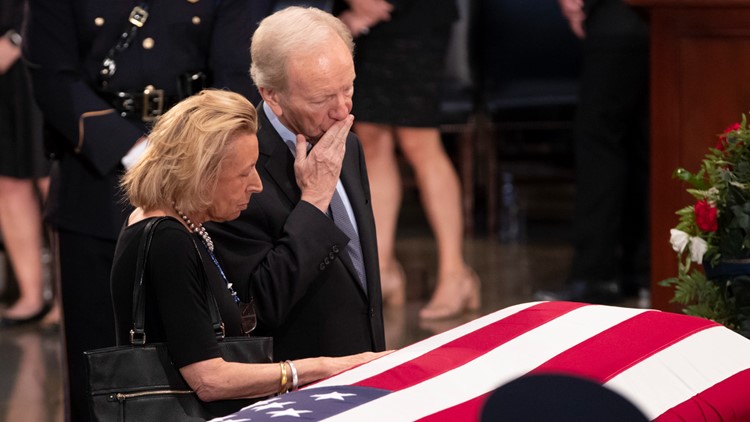HARTFORD, Conn. — Former U.S. Sen. Joe Lieberman of Connecticut, who was previously a vice presidential nominee, died Wednesday afternoon at age 82, according to a statement issued by his family.
Lieberman died in New York City due to complications from a fall, his family said.
"His beloved wife, Hadassah, and members of his family were with him as he passed," the family said. "Sen. Lieberman's love of God, his family, and America endured throughout his life of service in the public interest."
Lieberman vaulted into the national spotlight in the summer of 2000, joining Vice President Al Gore on the Democratic Presidential ticket. But he was well known before that to the people of his home state.
He was born on February 24, 1942 in Stamford. As World War II raged overseas, Lieberman spent his first years in a small house in the city years before it became a corporate center. His father Henry ran a package store. He attended Stamford High School - where decades later, he would launch his short campaign for president.
Lieberman attended Yale University, falling in with a liberal crowd. He was active in the civil rights movement and in 1963, he and other Yale students were among the first to travel to Mississippi to work on civil rights issues in a very hostile environment. Their task, to organize a mock election, was successful and paved the way for more college students the following year.
After graduating from Yale in 1964, he entered law school and graduated in 1967. He practiced law for three years and ran then-Sen. Robert Kennedy’s tragically brief presidential campaign in Connecticut in 1968.
Lieberman ran a successful campaign for the Connecticut State Senate in the contentious election of 1970, which saw Democrats split by the Vietnam War. One of the volunteers on the campaign was future President Bill Clinton, who was attending Yale University Law School.
Lieberman represented New Haven and rose to State Senate Majority Leader in 1975 where he served four years.
Joe Lieberman: A political life
He ran for U.S. Representative unsuccessfully in 1980. It was around that time that his marriage to his first wife Betty ended. Returning to private practice, he laid the groundwork for a successful campaign for Connecticut Attorney General in 1982.
In 1983, he married Hadassah Freilich. That January, he started as the state’s first full-time attorney general. According to Gwen Ifill, writing in The Washington Post, he spent his two terms transforming it from a low-profile office to a staunch defender of consumer issues.
In 1988, he took on Lowell Weicker in a race for the U.S. Senate. Lieberman had moved to more centrist positions by this time. Initially, the Lieberman campaign was sputtering as it rolled into the fall.
And then came the television ads.
Weicker, who had been in office since 1971, was famously portrayed in Lieberman’s ads as a sleeping bear, unconcerned with issues impacting Connecticut residents.
The ads broke Connecticut campaign conventions by going negative. The first ad was a cartoon drawing of a bear cave, with the unseen bear can be heard snoring. A deep-voiced narrator said, ''Lowell Weicker is like a big bear. On things that matter to him personally, he will always growl, but sometimes when it matters, he is sleeping. The official Congressional record reveals that Weicker has one of the worst attendance records in the Senate.''
The narrator winds up to release the big pitch, ''Could it make a difference if Joe Lieberman was fighting for us in the Senate? Do bears sleep in the woods?''
In the last month of the campaign, Lieberman surged in the polls and won the race, returning the seat to Democratic control and becoming the first Orthodox Jew to serve in the U.S. Senate.
From the outset, he worked the middle of the aisle. According to the Hartford Courant, Lieberman went to the state Republican’s reception following George W. Bush’s inauguration.
Throughout his career, he was a strong supporter of Israel. He consistently supported Democratic positions such as abortion rights. As time went on, Lieberman came to support school vouchers and other issues raised by conservatives. He was one of 10 Senate Democrats to support the Gulf War in January 1991.
In October of that year, Lieberman initially supported the nomination of Clarence Thomas to the U.S. Supreme Court. When the sexual harassment controversy came to light, he moved to undecided. When the vote was held, Lieberman opposed the nomination, but only after enough votes were cast to confirm the appointment.
Many times, his public positions vacillated on big issues like the 1993 spending cuts proposed by President Bill Clinton, leading to increased amounts of attention.
Lieberman rose to Democratic national prominence and served as chair of the Democratic Leadership Council from 1995 to 2001.
In 1998, he gave a speech to a nearly empty Senate chamber that would cause ripples for years to come.
For months, the nation had watched as an affair between Clinton and White House intern Monica Lewinsky made headlines. That summer, Clinton admitted to a federal grand jury that he had a relationship “that was not appropriate,” and that his previous denials were lies.
While the U.S. Senate was in recess, Lieberman mulled over making his criticism of Clinton public. If he did, he would be one of the first prominent Democratic elected officials to do so. A few weeks later, with the Senate was back in session, Lieberman found himself standing in the Senate chamber on Sept. 3, 1998.
He called out Clinton’s actions. “Such behavior is not just inappropriate,” Lieberman said, “it is immoral, and it is harmful.” He went on to say removing the president would be “unjust and unwise” and called for a public rebuke. He was praised for staying true to his moral beliefs.
In 2014, Lieberman said Clinton called him days after the speech and told him there wasn’t anything in the speech that Clinton didn’t agree with.
Lieberman went on to vote against Clinton’s removal from office after being impeached. But his speaking out was the leading reason Vice President Al Gore chose Lieberman to be his running mate in 2000 against Texas Governor George W. Bush.
Prior to the announcement, Lieberman was rumored to be in contention for the spot on the ticket. Rick Hancock, who was the political reporter for FOX61 at the time, recalled that the station sent a videographer on Sunday night to Lieberman’s New Haven home for a comment on the speculation. Hancock remembers the videographer just walked up to the door, knocked and spoke to Lieberman.
Hours later, a scene that had been quiet was now buzzing with police and media activity, as word broke of his being named to the ticket.
What followed was a frenzy of activity. A state AFL-CIO convention in Hartford that Lieberman was scheduled to speak at became an impromptu campaign rally when the senator stepped up to the podium.
Lieberman was on the ballot for the November election and decided not to quit his campaign. State law permitted his running for the two offices simultaneously. (His opponent in that race, Waterbury Mayor Phil Giordano, would be indicted less than a year later as a federal corruption investigation uncovered evidence of Giordano using a phone to arraign to have sex with children.)
A week after being named to the ticket, Lieberman flew in a private jet to join Al Gore at the Democratic National Convention in Los Angeles. His prior support for school vouchers had caused concerns among Black leaders. Landing well after midnight, he appeared hours later at a meeting of the Congressional Black Caucus at the Westin Bonaventure Hotel.
U.S. Rep. Maxine Waters spoke first with Lieberman at her side. “We wanted to know where he stood on affirmative action. We wanted to know where he stood on the voucher system. And we wanted to know where he stands on criminal justice issues.”
Lieberman blamed Republicans and the media for distorting his civil rights record. He told the crowd about his 30-year record defending civil rights issues.
“I have supported affirmative action, I do support affirmative action, and I will support affirmative action,” he told the crowd. Delegates responded with support for the senator.
He spoke to the full convention that night to sustained applause. In the crowd were campaign signs that said Gore / Lieberman in Hebrew.
The campaign was neck and neck, even after election night. Gore and Lieberman huddled in Nashville at Gore Campaign Headquarters. The three TV networks called Florida for Bush early in the evening, but then retracted the call. As the results come in for other states, it becomes clear the result in Florida would decide the election.
Early Wednesday morning, Gore called Bush to concede the election after the networks predicted a GOP win in the state. About 45 minutes later, Gore took back his concession.
For the next month, attorneys for Gore and Bush fought it out in court until The U.S. Supreme Court stayed the Florida recount and Bush became President-elect.
Lieberman returned to the U.S. Senate, since he had won the election for that seat in Connecticut.
Two years later in January 2003, Lieberman announced that he was running for president in a speech in the auditorium of his alma mater, Stamford High School. He held interviews in his mother’s home nearby. He sought and failed to receive the endorsement of his 2000 running mate, former Vice President Al Gore. Many Democrats questioned his support of the Iraq War. He had predicted that his support of the war would bring him the vote of the electorate, but Democrats skew liberal in primary voting, and he failed to gain support. He claimed to have “Joementum” leading up to the New Hampshire primary, coming in fifth with less than 10% of the vote, behind the eventual candidate, U.S. Senator John Kerry, Howard Dean, Wesley Clark, and John Edwards.
After poor showing in South Carolina, he came back to Connecticut, and in a press conference at Hartford’s city hall, surrounded by many Connecticut Democrats, he announced that he was dropping out of the race.
Lieberman continued his work in the U.S. Senate. However, at home, his support for Iraq war and the more conservative policies of George W. Bush eroded his Democratic base. Opposition to affirmative action, supporting Florida Gov. Jeb Bush in the Terry Schivao case, moves to privatize Social Security, all drained potential voters.
As he prepared to run again in 2006, a Democratic challenger emerged from Greenwich. Businessman Ned Lamont had great appeal to the more liberal members of the Connecticut Democratic Party. Despite Lieberman’s backing from Planned Parenthood and the Human Rights Campaign among others, as primary day drew near, Lamont pulled ahead in the polls.
On Aug. 8, 2006, Lamont beat Lieberman in the Connecticut Democratic Primary, becoming the party nominee. In his concession speech, Lieberman vowed to run as an independent candidate. After the votes were counted, the senator formed the Connecticut for Lieberman party.
The campaign was bitter. Insults flew back and forth. Both Lamont and Lieberman took flack for their positions and their rhetoric. Republican Alan Schlesinger, embroiled in his own campaign controversies over gambling, had little support. Many Republican office holders in the state endorsed Lieberman.
On Election Night, with support from Republican and independent voters, Lieberman defeated Lamont by 10 percentage points, 49.7% to 39.7%. The win ensured Lieberman’s return to Washington. He caucused with the Democrats and still had some committee assignments including being Chairman of the Homeland Security and Governmental Affairs.
As the 2008 Presidential campaign got underway, Lieberman was an early supporter of U.S. Sen. John McCain, his close friend. A decade later, Lieberman said he turned down McCain’s request to be McCain’s running mate in the 2008 race. Lieberman spoke at the Republican National Convention that summer, a move that did not win him friends in the Democratic Party.
In the waning days of the 111th Congress, Lieberman was instrumental in helping to pass legislation he had long supported, repealing the military’s Don’t Ask, Don’t Tell policy, allowing LGBTQ+ service members to serve openly.
In January 2011, Lieberman announced that he would retire from the U.S. Senate. U.S. Rep. Chris Murphy won the seat in November 2012, returning it to the Democrats.
After leaving the Senate, Lieberman was senior counsel to the law firm of Kasowitz Benson Torres in New York City.
He supported Hillary Clinton and Joe Biden in their presidential campaigns. His name was briefly mentioned in 2017 as a candidate to lead the FBI, after President Donald Trump fired Director James Comey. But after Trump said he was the leading candidate, Lieberman withdrew from consideration.
Lieberman’s mark on Connecticut and the country will long be remembered, both for his adherence to Democratic party principles and his forays across the aisle to support Republican policy and candidates, befitting a man who took the middle of the road.
Lieberman's family announced that his funeral will be held on Friday, March 29, 2024, at Congregation Agudath Sholom in his hometown of Stamford, Conn. An additional memorial service will be announced at a later date.
Doug Stewart is the Senior Digital Content Producer at FOX61 News. He can be reached at dstewart@fox61.com.
Have a story idea or something on your mind you want to share? We want to hear from you! Email us at newstips@fox61.com
HERE ARE MORE WAYS TO GET FOX61 NEWS
Download the FOX61 News APP
iTunes: Click here to download
Google Play: Click here to download
Stream Live on ROKU: Add the channel from the ROKU store or by searching FOX61.
Steam Live on FIRE TV: Search ‘FOX61’ and click ‘Get’ to download.

